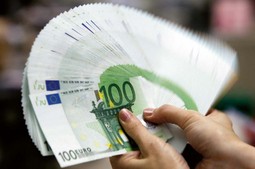Published in Nacional number 756, 2010-05-11
Croatia in the EU spiral
EU measures to also save Croatia
THE EUROPEAN UNION has created a 750bn euro fund to help the sinking economies of southern Europe, while will favourably reflect on the Croatian economy
 ERMANY AND THE LION'S SHARE German Foreign Minister Guido Westerwelle and Chancellor Angela Merkel; Germany will take the lion's share of patching up the EU economyThough Croatia is not a European Union Member State, the financial problems within the Eurozone could also cause massive losses in the Croatian economy. If the value of the euro continues to drop, Croatian citizens could soon find themselves facing significant increased in prices of energy and rising interest rates, while Croatian companies will surely face significant drops in revenue due to stagnant exports to EU markets. The most threatened economic sector would likely be tourism, as revenues in this sector are largely dependent on the economic position of western European states.
ERMANY AND THE LION'S SHARE German Foreign Minister Guido Westerwelle and Chancellor Angela Merkel; Germany will take the lion's share of patching up the EU economyThough Croatia is not a European Union Member State, the financial problems within the Eurozone could also cause massive losses in the Croatian economy. If the value of the euro continues to drop, Croatian citizens could soon find themselves facing significant increased in prices of energy and rising interest rates, while Croatian companies will surely face significant drops in revenue due to stagnant exports to EU markets. The most threatened economic sector would likely be tourism, as revenues in this sector are largely dependent on the economic position of western European states.
For these reasons, a continuation of the financial crisis in the European Union would almost certain cause a new cycle of economic recession in Croatia. As such, the agreement reached last week by the European Finance Minister for a three-year plan worth 750bn euro to assist flailing European countries was also of exceptional importance to the future of Croatia's economy. This massive package intended to strengthen the weakening faith of global investors in the future economic growth of the European Union and to halt the depreciation of the euro caused by the Greek crisis and quell investor fears of the crisis expanding into Portugal, Spain and Italy. Last week, the euro touched its lowest value against the US dollar in the past 14 months.
For Croatia, this plan is crucial, as the Croatian economy is virtually completely bound to the EU economy, as its member states are Croatia's most important trading partners. The value of the Croatian kuna is bound to the value of the euro, which in Croatia often serves as the main means of payment for financial transactions while more than 90% of the market share in the banking sector is held by banks seated in EU Member States. For that reason, any disturbances in the economy and monetary state in the EU are immediately visible in Croatia.
Economic expert Damir Novotny believes that the first effect of a depreciation of the euro would be felt in Croatia in the rise in prices of all imported goods traded in dollars. "It is certain that Croatia, as a highly euroized economy, shares the fate of the euro. If the value of the euro continues to weaken against the US dollar, which can be expected in this situation, then the price all goods and services traditionally paid for in dollars will rise. This primarily relates to energy, crude oil and oil derivatives, and other raw materials, such as mineral ores, iron and steel. On the other hand, a drop in the value of the euro would make Croatian companies more competitive in experts to dollar based markets, but unfortunately, there are few such companies. The dominant share of our exports is directed at the European Union, and if their economic issued continues, our exports to their markets will only decrease".
Rising costs for energy and other imported goods caused by appreciation of the dollar could cause serious economic problems for Croatia. Namely, about 20 percent of the total Croatian imports go to oil, oil derivatives, iron and steel, and these are all goods with a price tag in dollars. The value of imports of these goods in 2009 was some 3.5bn euro, and a depreciation of the euro of just ten percent would mean Croatian companies would have to pay about 2.5bn kuna more for the same goods. Such a growth in energy prices would mean a strong blow to the standard of living, as energy is an important factor in the formation of prices of virtually all mass consumption projects.
 THE WORLD FINANCIAL MARKET reacted favourably to the new measures by the European Union and the 750bn euro financial injectionSuch a development of events would pose an even greater problem for Croatian industry. Namely, energy prices have rising on several occasions in the past year, with the price of natural gas increasing by about 70 percent, and in turn the price of industrial production has also increased. New energy price hikes would further contributed to the already pronounced lack of competitiveness of domestic industry, and such a turn of events would likely result in a new wave of layoffs and increasing unemployment.
THE WORLD FINANCIAL MARKET reacted favourably to the new measures by the European Union and the 750bn euro financial injectionSuch a development of events would pose an even greater problem for Croatian industry. Namely, energy prices have rising on several occasions in the past year, with the price of natural gas increasing by about 70 percent, and in turn the price of industrial production has also increased. New energy price hikes would further contributed to the already pronounced lack of competitiveness of domestic industry, and such a turn of events would likely result in a new wave of layoffs and increasing unemployment.
One of the rare economic branches in Croatia that could profit from a change in the exchange rate between the euro and the dollar is the shipbuilding industry. Shipyards close their deals in US dollars, though a significant share of ship components, with the exception of steel, is paid for in euro. Over the past decade, shipyards recorded massive losses due to exchange differences as the euro appreciated, though this could now work in their favour. However, it is questionable as to just what degree the Croatian shipyards will be able to take advantage of such a situation, given the poor demand for ships on the world market.
For the majority of Croatian exporters, economic issues in the European Union are very bad news. Just under 50 percent of Croatian exports go to four EU Member States: Italy, Germany, Slovenia and Austria. All four countries are members of the eurozone, with the euro as the official currency, and it can be expected that continued issues with the euro could also cause a drop in spending on those markets. Such a trend is already present in Germany, where despite positive statistics on the recovery of the economy, retail sales recorded a 2.4% decline in retail sales. Therefore, Croatian companies could soon be facing a drop in revenues on foreign markets in the near future.
Negative effects could also be felt by Croatian companies operating in Serbia. Unlike Croatia, Serbia alongside Bulgaria has the strongest economic ties to Greece. This is particularly evident in the banking sector, considering that about 25% of the market share is held by Greek banks. Over the past decade, these banks have been very active in Serbia, and their business development has been founded on money pulled out of Greece and other foreign markets. As a result, today those banks have loan placements in Serbia valued at 185 percent of their deposits.
This makes their operations fairly unstable, especially in a situation when their mother banks in Greece are facing difficult times. They are not likely to fold, but in the next year, they will completely reduce their credit activities in Serbia due to a lack of money. This could result in a series of negative macroeconomic trends in Serbia, from a drop in investments to a reduction in the standard of living. This in turn could strongly impact the turnovers of Agrokor and Nexe Group, two Croatian companies with widely developed operations on the Serbian market.
The economic problems in Serbia are also likely to negatively impact the ambitious plans of the Croatian Tourism Ministry on increasing tourism arrivals from that country. In general, the Croatian tourism sector is largely threatened by the economic issues in the eurozone, as these are the countries from which the most guests visit Croatia. If the economic crisis continues to develop, there could be fewer visitors from those countries, and those who do come will spend less money.
 ECONOMIC EXPERT Damir Novotny feels that a drop in the euro will weaken Croatian exports in the EUA big problem for Croatia is the fact that a large share of arrivals are expected in last minute packages, where tourists decide where they will travel just before the start of their vacation. If the economic situation in European states worsens, it is likely that many of these tourists will cancel their travels, especially in countries where the level of consumer pessimism over the state of the national economy is high, such as in Germany.
ECONOMIC EXPERT Damir Novotny feels that a drop in the euro will weaken Croatian exports in the EUA big problem for Croatia is the fact that a large share of arrivals are expected in last minute packages, where tourists decide where they will travel just before the start of their vacation. If the economic situation in European states worsens, it is likely that many of these tourists will cancel their travels, especially in countries where the level of consumer pessimism over the state of the national economy is high, such as in Germany.
Thus it is evident that the competitiveness of Croatian exports and tourism will depend on the exchange rate of the kuna against the euro, and so the role of the Croatian National Bank will be important. Unlike its conduct over the past eighteen months, when it intervened on the foreign currency market to buy up kunas in order to prevent a devaluation of the Croatian currency, if the euro continues to drop in value, the central bank will have to do the opposite and buy up euros. A surplus of euros in the domestic financial system could be felt during the tourism season, and there is a threat that a strong kuna could negatively impact tourism spending.
The second important challenge for the central bank will be the operations of the banking sector. Croatian banks are not directly threatened by a drop in the value of the euro or by the problems in Greece, as virtually none of the banks operating on our market have significant claims in Greece. However, the development of the crisis in the eurozone could result in problems in the operations of Croatian banks.
This primarily relates to accessibility of capital. Namely, the development of the crisis could cause a drop in interest by global investors to loan money to the European banks, or to do so with higher interest rates. By changing their corporate policies under conditions of limited accessibility and high cost of capital, banks could decide to place their money on their home markets to facilities their economic recovery. A reduced inflow of foreign capital into Croatia would cause interest rates to rise.
For the time being, there are still no indications that interest rates will grow in Croatia, and such banks, such as Privredna Bank Zagreb have announced a drop in interest rates. However, if the crisis spreads from Greece into Portugal, Spain or Italy, the situation will quickly change.
A crisis in Italy would be a potentially serious problem for Croatia, as this country is the largest foreign investor in Croatia and one fifth of Croatian exports are intended for that market. Croatia's two largest banks, together holding 40% of the market share and 150bn kuna in assets, are owned by large Italian banking groups. If the crisis were to extend into that country, the consequences for the Croatian economy could be catastrophic.
For that reason, the new European agreement on the 750bn euro fund to save European economies could prove to be a key factor in the future development of the Croatian economy. If they want to avoid such situations in the future, those creating Croatia's economic policy will have to find a way to stimulate the activities of industry, especially the processing industry, as soon as possible, and to direct their exports to the markets of the Near East, Asia and South America.
Related articles
Suker no longer has anyone's support
Croatian Finance Minister Ivan Suker is the most isolated man in Croatia in recent days. Along with the harsh public criticism directed at him in… Više
Latest news
-
28.10.2010. / 14:15
'A profitable INA is in everyone's interest'
-
28.10.2010. / 09:38
Sanader’s eight fear SDP — Won’t bring down Government
-
21.10.2010. / 15:02
Interior Ministry turned a blind eye on Pukanic assassination
-
20.10.2010. / 09:34
Barisic could bankrupt HDZ




